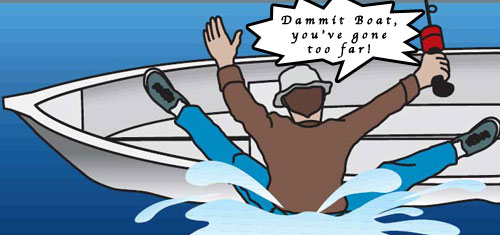Aside from the promotional tactics that we utilized at NACA a few weeks ago, we decided to have a little fun and mess with our friend Scott Alexander.
Our relationship with Scott goes way back to when he was performing and living in Baltimore. Now that he is living and working in Brooklyn, we see him a whole lot less. Recently we got to see him more because we partnered with him as an agency to present at NACA (more on this partnership’s Fails and Wins in an upcoming post). When we do see him, he never fails to remind us that we drink and goof off way too much. Based on that concept we decided to have Ryan and Curtis convince him that I had seriously gone off the deep end and that it was time to intervene.
Not only was Scott unamused, he was actually visibly upset. By the end of the weekend I caught him on video telling us about how we should be careful about Going Overboard when we get to fooling around (he meant this on a personal, as well as, professional level.)
Just a few days ago, he challenged me to talk a little bit about Going Overboard and how it can hurt your band. Instead, I’d like to put my own positive spin on this concept.
At its most basic incarnation, Going Overboard means doing something outrageous. When you do something outrageous and it goes horribly wrong, feelings get hurt, you lose a few fans, and you miss some opportunities. On the other side of the coin, if you try something outrageous and it works out, you look like a genius, you gain a TON of fans, and people beat down your door to get a piece of you.
Some good and bad examples of Going Overboard:
- Radiohead went overboard when they decided to let fans pay what they wished for their new album. (This is now imitated so much that its practically protocol for indie bands trying to sell an album)
- Kanye West went overboard when he hopped on stage to speak his mind during Taylor Swift’s acceptance speech. (He looked terrible for it. She gained a ton of sympathy. The parodied scene became an Internet sensation.)
- Barbet Schroeder went overboard when he walked into a producer’s office and threatened to cut off his own finger with a chainsaw if his movie lost financing. (He’s still directing tons of films with all ten digits firmly in place.)
- Devin Townsend went overboard when he decided to do a stylistic 180° shift. He gave up drugs and alcohol while writing, recording, producing and releasing 4 albums in a two year span. (He is now, arguably, more popular than has ever been.)
Whether the results are positive or negative, it’s a lot riskier to go overboard. It’s not necessarily more effective than consistently reinforcing the boundaries of taste. But it is definitely more fun, creative, and rewarding. It results in getting further along with relationships than you would have by just being polite. The most intriguing thing about Going Overboard, is that it is rarely intentional or planned. Going Overboard just sort of happens. Then things, good or bad, (finally) start to happen.

